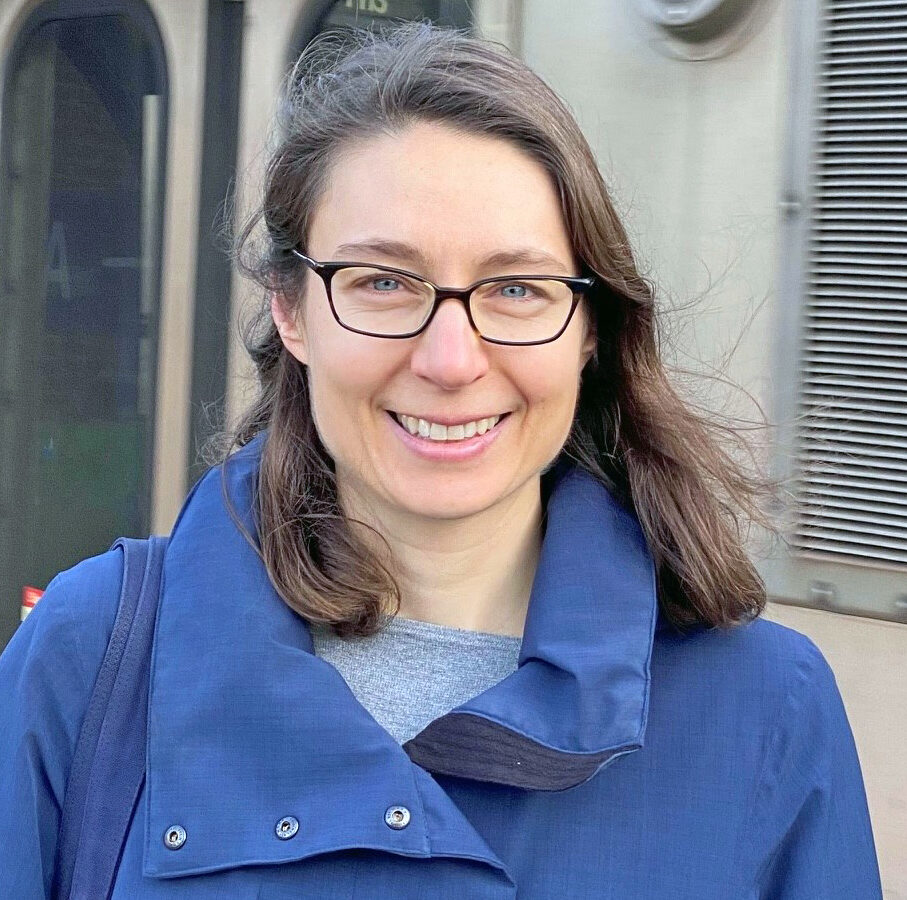Kate Tomford

When asked to recall some of the formative moments in her Exeter experience, Kate Tomford ’95 zeroes in on her lower-year math class. Math Instructor Anja S Greer had Tomford and her classmates keep journals chronicling how they were feeling about their math projects as a way of reinforcing the idea that everyone learns in their own particular way.
“It was almost like a psychology class, even though it was math,” Tomford says. “I remember her saying that part of going through school is just learning how you learn, understanding what works for you.” To this day, Tomford often calls on Greer’s expansive approach, especially when her two young children struggle with something they’re learning.
These and other experiences from her four years at Exeter were on Tomford’s mind in the spring of 2019, when she headed back to campus to take part in the school’s Climate Action Day. As a senior analyst at the Chicago Transit Authority, she led two seminars about her work managing the organization’s energy-related initiatives, including an ambitious program aimed at converting all of the Windy City’s buses from diesel to electric in the next 20 years.
Tomford was impressed by the students she met that weekend, particularly their energy and engagement with efforts to combat climate change. She recalls thinking about what makes an Exeter education so special, and the difference it can make in a person’s life. “Opening up the opportunity to attend Exeter to more kids is a way to have a lasting effect not just on someone’s individual life, but … on their family, their friends, their career,” she says. “There are spillover effects, I think, to the education that Exeter provides for one person.”
With her 25th reunion approaching in 2020 — along with the 50th anniversary of coeducation at Exeter — Tomford and her husband, David Grossman, decided to establish the Tomford-Grossman Scholarship Fund in honor of the teachers and coaches who “educated, inspired, encouraged and challenged” her during her years at Exeter.
In addition to Greer, who died of breast cancer in 1998, Tomford mentions Christine Wilson, an instructor in English who coached girls varsity crew during her upper and senior years, as being particularly influential. “She really knew how to drive people to their fullest,” Tomford says of Wilson. “She had a standard of excellence that I have always admired.”
Tomford credits her time at Exeter — and the miles she ran along wooded trails and back roads as a member of the soccer, winter track and crew teams — with helping to instill in her a love of the outdoors. The summer before her senior year, she helped track the progress of a glacier in Alaska as part of a National Science Foundation project, an experience that would later encourage her to major in earth and planetary sciences at Harvard.
As one of six steering committee members on the Women’s Leadership Circle, a new alumnae network focused on supporting the success of girls at Exeter, Tomford is committed to fostering the non sibi spirit among future generations of Exonians, particularly women. She and other members of the Women’s Leadership Circle plan to come back regularly to campus during the fall’s Leadership Weekend and meet with students who are entering their 10th-grade year.
Ideally, the women will then serve as resources and role models as the students progress through their upper and senior years and into their lives beyond Exeter. “In thinking about the advice that we as female alums can share with current students, I think one of the things I would say is that it’s not about any particular step that you take,” Tomford says, in an observation that sounds not unlike Greer’s long-ago advice about different learning styles. “It’s the cumulative steps that you take to do something that truly interests you, and that you feel motivated to pursue.”
— Sarah Pruitt ’95
Editor’s note: This article first appeared in the summer 2021 issue of The Exeter Bulletin.